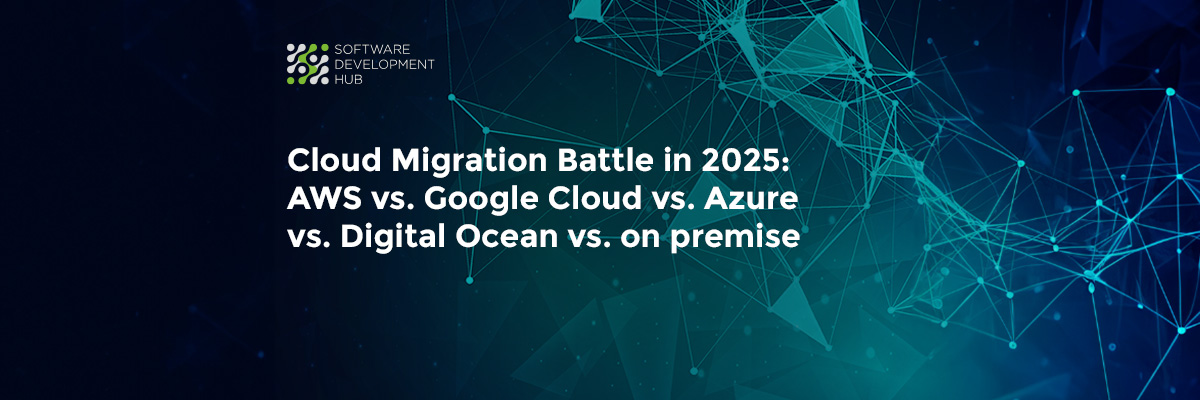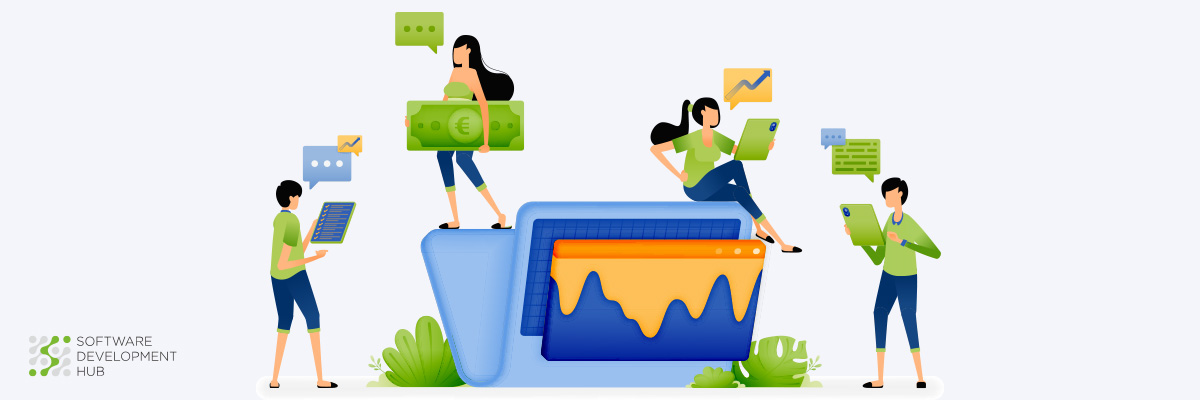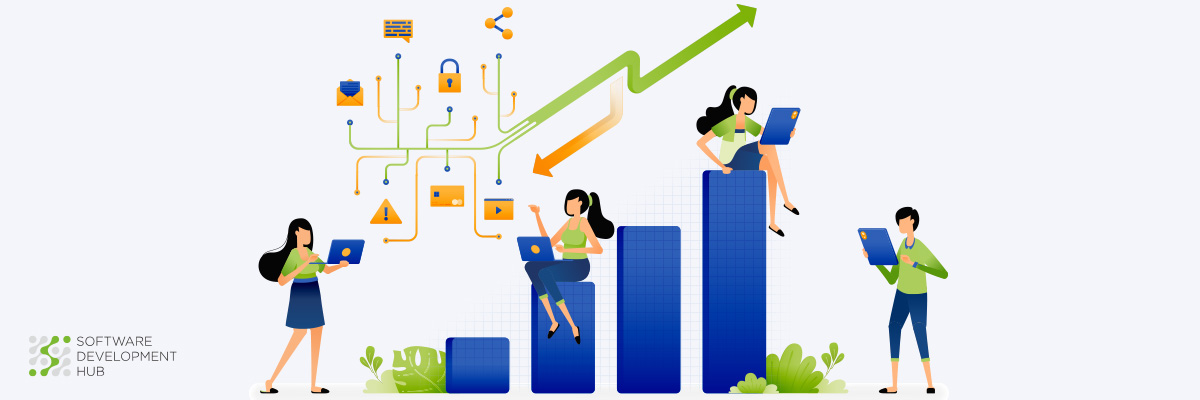IoT in Transportation: Solutions and Applications
Modern technologies have become great tools that are able to bring us a plethora of benefits. The Internet of Things, or IoT, is one of them. This is a concept that involves a network of physical objects that are controlled by software over the Internet.
The applications of IoT devices are wide enough and continue to expand.
They bring many advantages to people and companies in the form of process automation, predictions, finding the most appropriate and efficient scenarios and much more. According to Fortune Business Insights, the global IoT market is expected to reach a value of around $3,352.97 billion by 2030.

The Internet of Things in transportation is one of the most rapidly developing directions, which we will cover below. It is very relevant at the moment, as a large number of enterprises have already assessed the benefits of IoT in logistics, and due to that an increasing percentage of businessmen want to implement such solutions in their work processes.
Types of IoT solutions in transportation and supply chains
The integration of IoT (Internet of Things) in transportation and supply chains has led to the development of various innovative solutions.
|
Type of IoT Solution |
Description |
Applications/Use-Cases |
|
Fleet Management |
IoT devices track and manage vehicle fleets in real-time, improving efficiency and safety. |
Vehicle tracking, maintenance alerts, fuel management, driver behavior monitoring. |
|
Asset Tracking |
Uses IoT sensors to monitor the location and condition of assets throughout the supply chain. |
Real-time location tracking, condition monitoring (temperature, humidity), theft prevention. |
|
Predictive Maintenance |
Sensors on vehicles and machinery predict when maintenance is required, preventing breakdowns. |
Monitoring vehicle health, scheduling proactive maintenance, reducing downtime. |
|
Inventory Management |
Automated tracking of inventory levels and locations using IoT devices, improving accuracy and reducing manual work. |
Warehouse inventory tracking, automated restocking, theft detection. |
|
Connected Warehousing |
Smart warehouses use IoT devices to optimize operations, including automated sorting and environmental monitoring. |
Automated sorting systems, temperature and humidity control, energy management. |
|
Route Optimization |
IoT data is used to determine the most efficient routes for transportation, saving time and fuel. |
Real-time traffic updates, dynamic routing for delivery vehicles, congestion avoidance. |
|
Cold Chain Monitoring |
Specialized IoT sensors monitor the temperature and humidity of perishable goods during transportation and storage. |
Ensuring food and pharmaceutical safety, compliance with regulatory standards, reducing spoilage. |
|
Safety and Compliance |
IoT solutions enhance safety and ensure compliance with transportation regulations. |
Driver monitoring (fatigue, speed), vehicle safety checks, compliance with transportation laws and regulations. |
|
Environment Monitoring |
Sensors measure environmental conditions affecting transportation and logistics, like weather and road conditions. |
Weather condition monitoring, hazardous condition alerts, adapting operations to environmental changes. |
|
Smart Parking Solutions |
IoT-enabled smart parking solutions for efficient management of vehicle parking, especially in urban areas. |
Real-time parking availability, automated payment systems, reducing congestion and pollution from searching for parking. |
|
Container Monitoring and Management |
IoT devices provide real-time data on shipping container status and location. |
Tracking container location, ensuring the security of cargo, monitoring container conditions during shipping. |
|
Last-Mile Delivery Optimization |
IoT technologies optimize the last segment of the delivery process, improving efficiency and customer satisfaction. |
Real-time delivery tracking for customers, automated delivery notifications, route optimization for delivery vehicles. |
Read also: Logistics and Supply Chain Events to Attend in Europe 2024
Applications of IoT in transportation
The IoT market offers many different options for use in supply chains. Here are a few of the most notable and advantageous of them as of today.
iBeacons
Beacon is a small data transmitter that can be attached to anything you need and it will transmit information to the user's display using Bluetooth technology. In logistics, this solution is designed to help organizations effectively manage and track assets (e.g. localization of the required inventory, availability ofthe required amount of pallets, containers, etc.). What is more, with the help of the above-mentioned solution, it is possible to reduce the risk of making irrational decisions, as well as minimize the chances of loss or theft of goods.
Warehouse management
The efficiency of warehouse management has a huge impact on supply chains. The Internet of Things is able to simplify and automate almost all operational processes. As an example, this can be realized with the help of:
- smart shelves systems (they show the position and quantity of the products in a real-time by scanning barcodes)
- autonomous vehicles (they are designed to collect goods from the warehouse and deliver them to the loading locations)
- environmental control sensors (they monitor the conditions in which the goods are stored so that they do not spoil) and more.
Global Positioning System (GPS) tracking
Today's technologies make it possible to use special IoT trackers to monitor in real time the positioning of goods or vehicles that deliver them. It is beneficial both for logistics companies and their customers. In the first case, it is possible to calculate working time, costs and optimize processes. While in the second one, customers are able to get information about the transportation of their goods and track the time of their arrival.
IoT sensors
At the moment, the market is ready to offer a variety of sensor options that can help control both the condition of the vehicles (fuel level, possible malfunctions, etc.) and the conditions in which the goods being delivered (temperature compliance, humidity, bump sensors, etc.). This allows transportation companies to provide quality service for customer satisfaction, as well as quick response in cases of problems.
Traffic Management
In this case, IoT devices collect data on the movement of transport vehicles, traffic jams, weather conditions along the route, suitable parking places, and any road accidents that may affect the delivery. In this way it is possible to optimize the route, reduce fuel expenses and ensure on-time delivery.
How to build a custom IoT solution
These solutions demonstrate the vast potential of IoT in transforming transportation and supply chain operations, leading to greater efficiency, enhanced safety, and improved overall service quality. Software Development Hub (SDH) is a company that provides IT outsourcing services to logistics and transport companies and startups from all over the world. Solutions developed by our experts always meet the needs of clients and bring them to a new level of competitiveness. Your convenience and profitability are the key success indicators of our work. There is no need to kick software development into the long grass.
Discover our IoT portfolio:
Start cooperating with us right now and make your business better!
Categories
About the author
Share
Need a project estimate?
Drop us a line, and we provide you with a qualified consultation.








